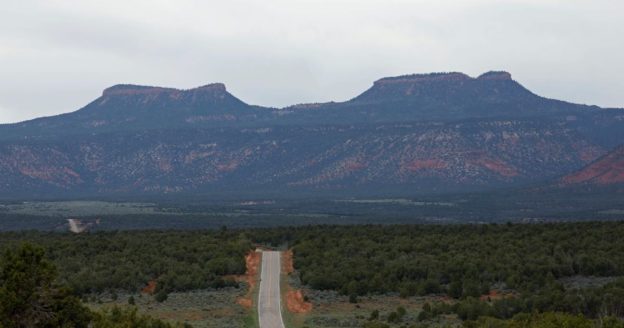When the pandemic hit, nightly walks with my wife became part of my pandemic routine – a chance to escape the chaos of the world and take solace in the natural beauty of Utah’s mountainscape. But over the summer, that escape hatch closed. West Coast wildfires turned our air into smoky haze, making it so unhealthy and hazardous to be outdoors that our peaceful moments of refuge became reminders of a looming threat.
While the company I lead is focused on the movement of money, I’d be shortsighted to ignore that looming threat on the horizon, because, frankly, it threatens our existence. As noted in a recent report commissioned by the US Commodity Futures Trading Commission, titled “Managing Climate Risk in the U.S. Financial System,” it’s not just the physical risks—the hard costs of damage from fires, floods, hurricanes and derechos—that threaten harm. “A world racked by frequent and devastating shocks from climate change cannot sustain the fundamental conditions supporting our financial system,” the report concluded. In other words, money won’t matter in a world where climate change is unchecked, where continents are ablaze, glaciers are melting, and rainforests are disappearing.
I may lead a fintech company, but primarily, I lead 450 hardworking employees. With their well-being in mind, it would be irresponsible if I didn’t speak out about the climate crisis. And perhaps because I work in fintech, I’m compelled to speak out about the financial implications of this crisis. From the threat to US financial markets detailed recently by the CFTC to the potential risk for banks highlighted in a recent report from the sustainability nonprofit Ceres, it’s clear the cost of climate change will be catastrophic. A recent study on Australia, for example, found that a lack of climate action would cost the Australian economy $3.4 trillion and 880,000 jobs over the next 50 years, while adopting policies promoting net zero emissions by 2050 would create 250,000 jobs and add $680 billion to the economy.
With so many voices weighing in on the side of “We can’t afford to address climate change,” we need every knowledgeable voice possible to articulate the true cost-benefit balance in terms people can understand.
A to-do list for Biden, and for business leadersWhen the world went into lockdown and we saw a vast reduction in human movement and activity, we got a glimpse of an alternative future where the Venetian canals are clear enough to see fish, and Los Angeles, notorious for smog, has some of the cleanest air in the world. This is the future that our children and grandchildren deserve, and we now know that the collective action of human beings makes it possible. The latest data from the International Energy Agency shows that the drastic reduction of global economic activity and mobility during the first quarter of 2020 pushed down global energy demand by 3.8% compared to the first quarter of 2019. There hasn’t been a decline like that in the past 70 years.
With the inauguration of US president Joe Biden complete, there’s hope that this issue can and will be addressed. On his first afternoon in office, he returned the US to the Paris climate accord. I’m hoping that’s just the first of many reversals to former president Donald Trump’s problematic climate policies. Biden must reverse the Trump-driven Environmental Protection Agency rule that weakened regulations on the release of mercury and other toxic metals from oil and coal-fired power plants. He must also reverse the Trump administration’s plan to reduce Bears Ears and Grand Staircase-Escalante national monuments, and stop the US Department of the Interior from permitting drilling, mining and grazing on these breathtaking Utah landmarks. But we can’t rely on the government to solve this crisis alone.
ESG investing (Environmental, Social and Governance) can be a driver of change, as investments into companies and technologies that are mission-driven can have an impact on the way companies behave. We need to go beyond this as leaders and as individuals. In the case of clean air, we need to incorporate sustainability principles into our core values and take action.
At my company, Galileo Financial Technologies, that means providing incentives for employees to lead cleaner lives. We’ve been powering our home and company headquarters in Salt Lake City with green energy for several years now and have encouraged employees to do the same, offering to pay 50% of their home power bill if they do. We’ve also encouraged our employees to drive electric cars, offering $5,000 toward the purchase.
But the big change I’m committing to now is remote work. This pandemic has revealed the effectiveness and positive environmental impact of a remote workforce, and I will never require all employees to commute to the office again. Like many other leaders, I’m committed to a hybrid remote work model, and for those who do choose to drive into the office, I’m committing to buying the carbon offset for their commutes, making it part of Galileo’s standard operating procedure. These are just a few examples of how CEOs can make small, incremental improvements by galvanizing the people they lead.
Many CEOs refrain from expressing political opinions for fear of alienating customers and employees, but I believe failing to speak out about this critical risk to our existence would be even more alienating. We can’t wait. 2020 was the warmest year on record. A median 70% of people across 14 countries say climate change is a threat to their country’s survival. While the scale and scope of this climate crisis is overwhelming, we can’t cower in fear. We must rise to the occasion and lead not with politics but by example, because humanity depends on it.

Comments are closed